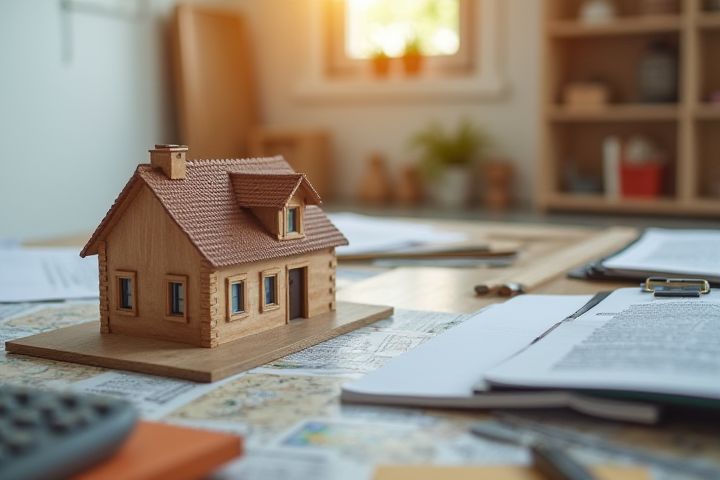
House renovations can be tax-deductible under certain conditions. If you perform renovations to improve a property used for rental or business purposes, you may be eligible to deduct those expenses from your taxable income. For primary residences, renovations may not be directly deductible, but specific energy-efficient upgrades could qualify for tax credits. It's essential to keep detailed records of all expenses related to renovations to ensure accurate reporting. Consult with a tax professional to navigate the specifics of tax laws and determine eligibility for deductions based on your unique situation.
Can House Renovations Be Tax-Deductible
Capital improvements
House renovations that qualify as capital improvements can potentially be tax-deductible. Capital improvements are defined as upgrades that enhance the value of your home, extend its useful life, or adapt it for new uses. For instance, major renovations like adding a new roof, installing energy-efficient windows, or remodeling a kitchen can be classified as capital improvements. It's important to keep thorough records of these expenses, as they may reduce your capital gains tax when you sell your home, potentially saving you thousands of dollars.
Medical-related renovations
Medical-related home renovations may be tax-deductible if they serve a specific medical purpose. For example, installing ramps or widening doorways to accommodate a wheelchair could qualify as eligible expenses. You can claim these costs as itemized deductions on your federal tax return under medical expenses. It's essential to keep precise records, as the IRS allows you to include only those renovation costs exceeding 7.5% of your adjusted gross income (AGI).
Energy efficiency upgrades
Energy efficiency upgrades, such as installing solar panels, energy-efficient windows, or HVAC systems, can potentially qualify for tax deductions or credits, helping you save significantly on your tax bill. The federal government offers incentives, like the Residential Renewable Energy Tax Credit, which provides a percentage of the installation costs for solar energy systems, currently set at 26% through 2022. In addition, various states and local governments may provide their own tax breaks or rebates for energy-efficient home improvements, which can vary widely in value and eligibility criteria. To maximize your savings, keep detailed records of all expenses related to these upgrades and consult a tax professional to navigate the specific requirements.
Home office renovations
Home office renovations can be tax-deductible if your workspace meets specific IRS criteria, permitting you to claim a portion of your expenses. For instance, if your home office constitutes 10% of your home's total square footage, you may deduct 10% of renovation costs, including materials and labor. It's essential to maintain detailed records, as the IRS requires documentation to support your claims. Remember, the home office must be used exclusively for business purposes to qualify for these deductions.
Rental property enhancements
Property owners can often deduct costs related to house renovations when they improve rental properties, enhancing both value and functionality. Renovations such as replacing roofs, upgrading HVAC systems, or remodeling kitchens can qualify as capital improvements, which may be depreciated over time. According to IRS guidelines, you can typically deduct costs if the project extends the property's life or adapts it to a different use. Keeping accurate records of your renovation expenses, including receipts and invoices, ensures you maximize your potential tax deductions.
Selling property adjustments
House renovations may be tax-deductible when it comes to selling property, particularly if these improvements increase the home's value or extend its lifespan. Major renovations, such as kitchen remodels or adding new bathrooms, can be added to your home's cost basis, potentially reducing your capital gains tax when you sell. If your total capital gains exceed the exclusion limits--$250,000 for single filers or $500,000 for married couples filing jointly--you may benefit from these deductions. Keeping thorough records of all renovation costs is essential for maximizing your deductions and ensuring compliance with IRS regulations.
Tax credit eligibility
House renovations may qualify for tax deductions or credits, particularly if they enhance energy efficiency or modify the home for medical needs. The Energy Tax Credit offers up to 30% reimbursement on the installation of qualified renewable energy systems, potentially saving you thousands. For homeowners making accessibility renovations for individuals with disabilities, the Medical Expense Deduction can cover certain costs exceeding 7.5% of adjusted gross income. Always consult with a tax professional to verify eligibility and maximize your benefits.
Record-keeping importance
Maintaining accurate records of your house renovations can significantly impact your potential tax deductions. Items such as receipts, invoices, and contracts should be meticulously organized, as these documents substantiate your expenses. For example, renovations that enhance energy efficiency or adapt your home for accessibility might qualify for specific tax credits, making record-keeping essential for maximizing deductions. Keeping detailed documentation not only helps ensure compliance with IRS regulations but also can lead to substantial savings when filing your taxes.
Exclusion limits
House renovations can be tax-deductible if they meet specific criteria, particularly for improvements related to medical necessity or home office use. For example, if you modify your home for accessibility due to a medical condition, the costs may qualify under the IRS guidelines, reducing taxable income. The exclusion limits can vary; expenses that exceed your adjusted gross income (AGI) may provide a deduction up to certain thresholds established by the IRS. For home office renovations, ensure they are exclusively used for business purposes to maximize potential tax benefits.
Professional consultation benefits
Professional consultation for house renovations can be tax-deductible under specific circumstances, particularly if the improvements enhance the property's value or adapt it for business use. If you hire an architect or designer for a project that qualifies as a capital improvement, you can potentially claim those costs when you file your taxes. This means that engaging with experts not only elevates your renovation project but may also yield financial benefits through deductions. Keep meticulous records of costs and consultations to maximize your potential tax advantages.
